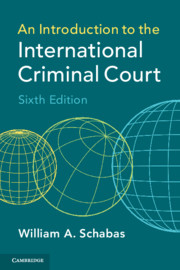Book contents
- An Introduction to the International Criminal Court
- An Introduction to the International Criminal Court
- Copyright page
- Contents
- Preface
- Abbreviations
- 1 Creation of the Court
- 2 The Court Becomes Operational
- 3 Jurisdiction
- 4 Triggering the Jurisdiction
- 5 Admissibility
- 6 General Principles of Criminal Law
- 7 Investigation and Pre-Trial Procedure
- 8 Trial and Appeal
- 9 Punishment
- 10 Victims of Crimes and Their Concerns
- 11 Structure and Administration of the Court
- Appendices
- Bibliography
- Index
6 - General Principles of Criminal Law
Published online by Cambridge University Press: 09 June 2020
- An Introduction to the International Criminal Court
- An Introduction to the International Criminal Court
- Copyright page
- Contents
- Preface
- Abbreviations
- 1 Creation of the Court
- 2 The Court Becomes Operational
- 3 Jurisdiction
- 4 Triggering the Jurisdiction
- 5 Admissibility
- 6 General Principles of Criminal Law
- 7 Investigation and Pre-Trial Procedure
- 8 Trial and Appeal
- 9 Punishment
- 10 Victims of Crimes and Their Concerns
- 11 Structure and Administration of the Court
- Appendices
- Bibliography
- Index
Summary
The primary source of law before the Court is the Statute itself and the principal subsidiary instruments, the Elements of Crimes and the Rules of Procedure and Evidence. The Court may also refer to relevant rules of international law, notably those of international humanitarian law and international human rights law. Article 25 of the Statute sets out the various forms of participation in crimes starting with direct perpetration but also including ordering and forms of complicity and attempt. Article 28 defines so-called command or superior responsibility, by which an individual may be held responsible for crimes perpetrated by subordinates. The Court cannot prosecute an individual who was under 18 at the time of the crime. Statutory limitation of crimes within the Court’s jurisdiction is prohibited. There is a presumption that all crimes subject to the Court’s jurisdiction require proof of intent and knowledge. Several defences are codified: diminished mental capacity, voluntary intoxication, self-defence, duress and necessity, mistake of law and mistake of fact and, under limited circumstances, superior orders.
Keywords
- Type
- Chapter
- Information
- An Introduction to the International Criminal Court , pp. 203 - 248Publisher: Cambridge University PressPrint publication year: 2020



